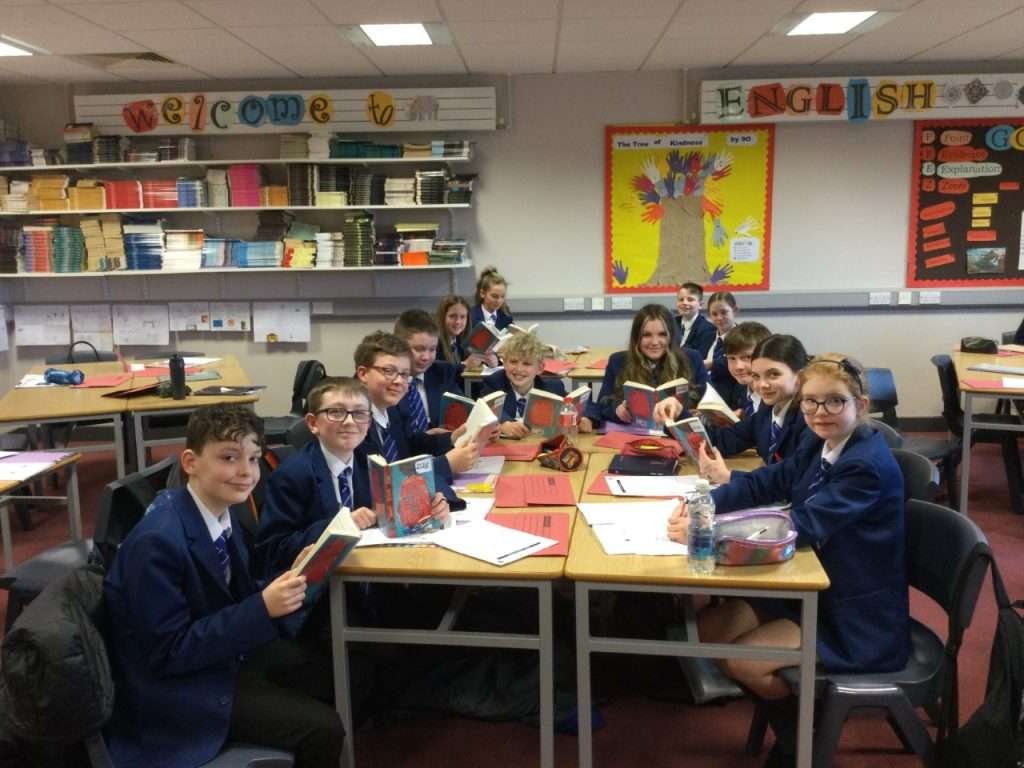Aims and Overview of the English Department
The English Programme of Study states that: “Learning and understanding activities in English contribute to achievement of the curriculum aims for all young people to become successful learners who enjoy learning, make progress and achieve.”
Therefore, as a department, we aim to develop pupils’ skills in the areas of: talking and listening, reading and writing and to introduce them to the world of Literature which is “rich and influential, reflecting the experiences of people from many countries and times and contributes to a sense of cultural identity. Pupils will learn to become enthusiastic and critical readers of stories, poetry and drama as well as non-fiction and media texts, gaining access to the pleasure and the world of knowledge that reading offers.“ We aim to show our pupils how language works so that they can understand writers’ techniques and develop their own style of self-expression, finding their unique “voice.”
Hence our aims are to teach the following key concepts that pupils need in order to deepen and broaden their knowledge, skills and understanding. These essential concepts promote pupil progress in talking and listening, reading and writing, empowering young people to achieve their potential and to make informed and responsible decisions throughout their lives:
- Competence;
- Creativity;
- Cultural understanding;
- Critical understanding.
Our pupils explore English in a media-rich environment that appeals to the 21st century generation. As a department, we strive to develop literacy, e-literacy and their inter-personal communication.
Being a pupil-centred department, we abide by the following philosophy:
“Pupils are interested in learning: they have the expectations of success, they have the confidence to take risks, make mistakes and ask for help.” (Evaluating English; DENI)
Staffing
Mr D. Campbell (Head of Department)
Mrs M. R. Black
Mrs H. Parker
Miss L. Dunwoody
Mr S. Hennessy
Mrs C. Massey
Mrs L. McKeeman
Mrs C. Reid
Mrs R. Strange
Facilities
The department is located on the middle floor of the main block where we have eight teaching rooms. All English teachers each have their own rooms in Ballyclare Secondary School. We have four new classrooms in the new building, furnished with Promethean Smart boards, a Department Room and an HOD office. The department is well-resourced with interactive whiteboards in all teaching rooms. Relevant and modern textbooks and access to a computer are available to all members of the department. We also have a group room, to facilitate the teaching of small groups of pupils and the school Library which is well-resourced, particularly with computer facilities.



Why Study English?
- Because it's important Two billion people in the world communicate in English everyday! It is important to be able to communicate effectively with others, especially in the world of work. English is also important in that it helps with other subjects too. It is invaluable for your future, no matter what it is you want to do. A good command of the spoken and written word will help you every day!
- Because it's fun Think of all the word games that can be played: crosswords, Scrabble®, media word shows, and many other quizzes and guessing games that tease millions daily.
- Because it's beautiful Reading is a pleasure, a way of escaping into another world. Literature is entertaining and the language used can be truly beautiful.
‘I already knew that words could take you into a new world, but I didn't know that on the strength of one word spoken for my ears only I would find myself in a room that no one else knew about.’ Mr Pip, Lloyd Jones
'The oldest books are still only just out to those who have not read them.’ Samuel Butler
- Because it's useful
The skills of reading, writing, speaking and listening are important in every job. Communicating successfully is the key to success. The more we know about the language, the more chance we shall have of success, whether we are advertisers, politicians, priests, journalists, doctors, lawyers--or just ordinary people at home, trying to understand and be understood.
Students must come to class with pens and paper, ready to get creative!

Useful web links
www.nicurriculum.org.uk/
http://www.nicurriculum.org.uk/key_stage_3/areas_of_learning/english/
http://freerice.com/
www.literacyshed.com/
www.sparknotes.com/
www.gradesaver.com/
www.shmoop.com/
www.tes.co.uk/
www.teachit.co.uk/
www.poetryarchive.org/
www.edmodo.com/
http://www.poetryarchive.org/poetryarchive/home.do
http://www.bbc.co.uk/schools/gcsebitesize/english/
http://www.bbc.co.uk/schools/gcsebitesize/english_literature/
